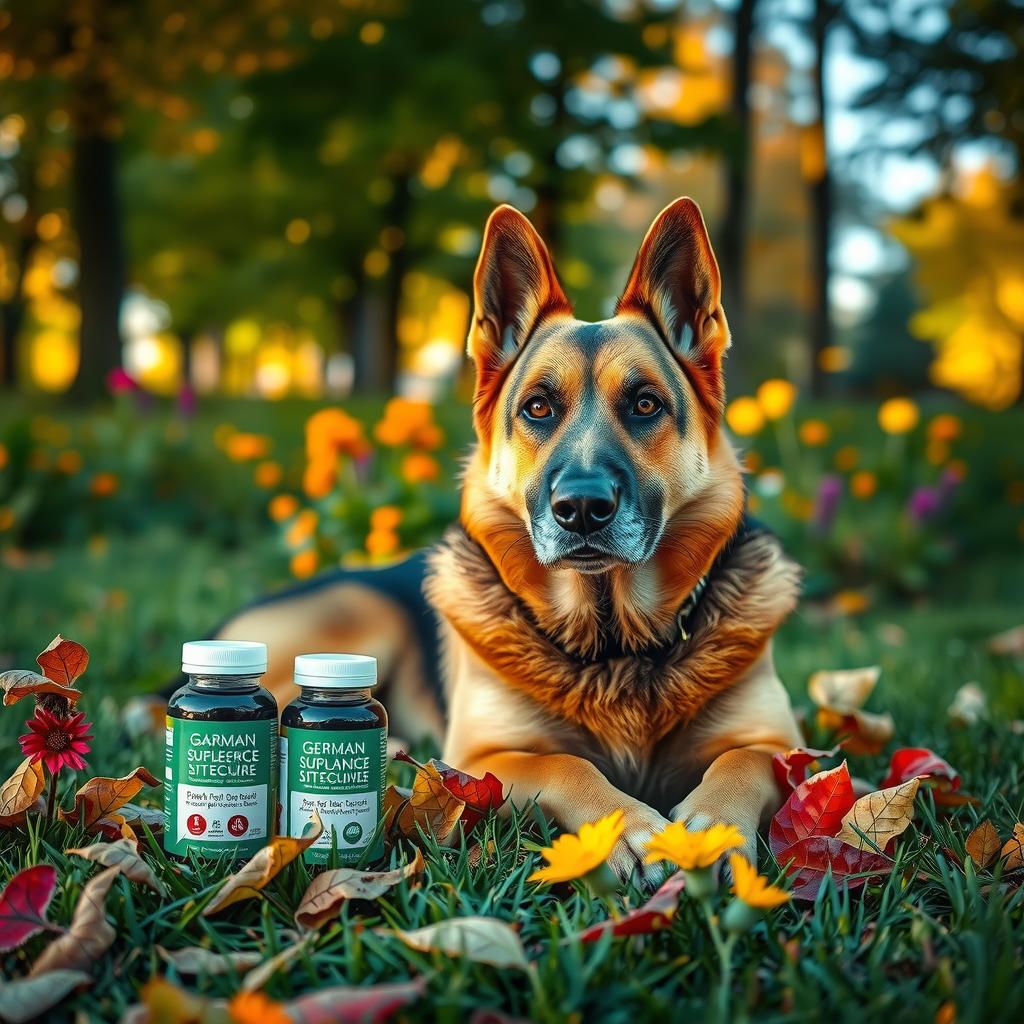As German Shepherds age, they often face a myriad of health challenges, particularly concerning their joints. This breed is known for its strength and agility, but with advanced years comes the inevitability of joint issues such as arthritis in dogs, which can severely impact their mobility and overall quality of life. For pet owners who cherish these loyal companions, witnessing a decline in their beloved dog’s vitality can be disheartening. However, there are viable solutions to support German Shepherd health during this crucial stage of life.
One effective approach gaining traction among veterinarians and dog owners alike is the use of joint supplements tailored specifically for aging dogs. These products play a vital role in maintaining canine mobility support by addressing inflammation and promoting healthy cartilage function. With so many options available on the market today, it’s essential to understand how joint supplements can enhance senior dog nutrition while targeting specific needs related to aging canine bodies.
Incorporating well-researched pet health solutions, including natural ingredients like glucosamine and chondroitin sulfate found in many joint supplements, offers promising benefits for elderly German Shepherds struggling with discomfort or stiffness. By providing these supportive nutrients daily or as recommended by a veterinarian, pet parents can help alleviate some symptoms associated with arthritis in dogs while improving overall joint care.
Moreover, beyond just pain relief and physical comfort lies an important emotional aspect: maintaining an active lifestyle contributes significantly to mental well-being for both pets and their owners alike. The simple act of going for walks or playing fetch fosters not only physical activity but also strengthens the bond between owner and dog—an invaluable connection that transcends age barriers.
This article explores various aspects surrounding joint supplements for aging German Shepherd dogs, discussing how they work best when integrated into a comprehensive care plan aimed at enhancing longevity and vitality. From understanding the signs that indicate your furry friend may benefit from additional support to exploring different supplement types available today—this guide aims to equip you with knowledge essential for navigating your dog’s journey through their golden years efficiently!

Key Points:
-
The Importance of Joint Supplements for Aging German Shepherds: Enhancing Mobility and Comfort
As German Shepherds age, they may experience stiffness and decreased mobility due to conditions like arthritis in dogs. Incorporating joint supplements into their diet is crucial for maintaining their mobility. These supplements often contain glucosamine and chondroitin sulfate, which help fortify cartilage and promote flexibility, thereby improving the overall quality of life for senior pets. -
Tailoring Senior Dog Nutrition: Supporting Joint Health Through Diet
In addition to joint supplements, proper nutrition plays a vital role in supporting German Shepherd health. A balanced diet tailored specifically for aging dogs can assist in managing weight, which is essential to reduce strain on joints. By ensuring that senior dog nutrition includes ingredients that complement joint support products, pet owners can foster an environment conducive to improved canine mobility support. -
Recognizing Signs of Joint Issues: Proactive Dog Joint Care
Understanding the signs that indicate potential joint problems is key to effective dog joint care. Common indicators such as reluctance to exercise or difficulty rising should prompt pet owners to consider integrating joint supplements into their dog’s regimen. Being proactive not only helps mitigate the effects of arthritis but also ensures that loyal companions remain active and happy throughout their golden years.

Understanding Joint Health in Aging German Shepherds
The Age Factor: How Time Influences Canine Mobility
As dogs age, particularly larger breeds like German Shepherds, the effects of aging can significantly impact their joint health. One of the most common issues that arises is arthritis, a degenerative condition characterized by inflammation and pain in the joints. This chronic ailment not only affects mobility but also diminishes the overall quality of life for these beloved pets. As they transition into their senior years, it becomes increasingly important for owners to recognize early signs of joint discomfort or stiffness that may indicate underlying problems such as arthritis. Incorporating joint supplements into a senior dog’s nutrition can be an effective way to support their joint function and alleviate some symptoms associated with these conditions.
The biology behind aging reveals that as dogs grow older, cartilage—the protective tissue at the ends of bones—starts to deteriorate more rapidly than it can regenerate. In larger breeds like German Shepherds, this process leads to increased wear and tear on joints such as hips and elbows, making them more susceptible to pain and decreased mobility over time. Owners should remain vigilant about changes in behavior; reluctance to engage in physical activities like walking or climbing stairs often signals discomfort related to joint health issues. Regular veterinary check-ups become essential during this phase; veterinarians may recommend various pet health solutions, including specialized diets rich in nutrients aimed at promoting healthy joints or prescribing joint supplements designed specifically for aging dogs.
Signs of Declining Mobility
Recognizing Early Symptoms for Better Intervention
Monitoring canine mobility is crucial when assessing a German Shepherd’s well-being as they age; subtle changes can indicate significant underlying problems. Common indicators include difficulty getting up after rest periods, noticeable limping during walks, or even reluctance towards playtime activities they once enjoyed enthusiastically. These behavioral shifts should prompt immediate attention from both pet owners and veterinary professionals alike since early intervention plays a vital role in managing conditions like arthritis effectively.
In addition to observing behavioral cues, regular exercise tailored according to an individual dog’s capabilities remains critical throughout their golden years; moderate activity helps maintain muscle strength while reducing excess weight—a contributing factor exacerbating joint stress among aging dogs. Furthermore, incorporating prescribed joint supplements into daily routines offers additional support through ingredients such as glucosamine and chondroitin sulfate which are known for promoting cartilage repair while improving overall flexibility within affected joints.
Understanding how aging impacts joint health allows pet owners not just insight into maintaining better care standards but also fosters stronger bonds with their canine companions through proactive measures taken against debilitating ailments like arthritis affecting mobility levels over time.
The Importance of Joint Supplements for Canine Mobility
Understanding How Joint Supplements Support Aging Dogs
As dogs age, their mobility can decline significantly, which may lead to discomfort and a decrease in quality of life. This is particularly evident in breeds such as the German Shepherd, known for their active lifestyles but prone to joint issues like arthritis. Joint supplements play an essential role in supporting canine health by enhancing joint function and reducing inflammation. Key ingredients found in many joint supplements include glucosamine and chondroitin sulfate, both of which are critical for maintaining cartilage integrity and promoting overall joint health. Glucosamine helps stimulate the production of synovial fluid, which lubricates joints while also aiding in tissue repair. Chondroitin sulfate complements this action by providing structural components necessary for cartilage resilience.
Moreover, these compounds can alleviate the pain associated with osteoarthritis—a common condition among aging dogs—thereby improving mobility and allowing pets to engage more freely in physical activities that they enjoy. Incorporating joint supplements into senior dog nutrition plans not only addresses existing joint problems but also serves as a proactive measure against future deterioration due to aging or breed predispositions to certain ailments. It’s crucial for pet owners to consult with veterinarians when considering these pet health solutions, ensuring they choose products formulated specifically for their dog’s unique needs.
Ingredients That Matter: A Closer Look at Glucosamine and Chondroitin
Exploring Essential Components Found in Effective Joint Supplements
When examining effective joint supplements, one cannot overlook the significance of glucosamine and chondroitin sulfate within these formulations. Glucosamine is often derived from shellfish or produced synthetically, functioning primarily as a building block for glycosaminoglycans—the molecules responsible for maintaining healthy cartilage structure. In contrast, chondroitin sulfate works synergistically with glucosamine; it inhibits enzymes that break down cartilage while attracting water into the joints, enhancing cushioning effects during movement.
The combination of these two powerful ingredients has been shown through various studies to improve outcomes related to arthritis in dogs significantly over time compared to those receiving placebo treatments alone (source: veterinary research publications). Furthermore, newer formulations may incorporate additional elements like MSM (methylsulfonylmethane) or omega-3 fatty acids from fish oil—a boon for anti-inflammatory properties—which further bolster canine mobility support efforts.
For pet owners concerned about their furry companions’ well-being—especially those managing conditions associated with aging—it becomes imperative that they prioritize high-quality joint supplements tailored towards achieving long-term benefits rather than quick fixes alone. As awareness grows regarding dog joint care strategies paired alongside traditional veterinary approaches such as prescribed medications or physical therapy options; embracing holistic solutions stands out as viable paths forward toward fostering happier lives filled with activity even amidst challenges posed by growing older years ahead!
Nutritional Foundations for Aging German Shepherds
Understanding the Importance of Tailored Nutrition
As dogs age, their nutritional needs evolve significantly, particularly for breeds like the German Shepherd that are prone to joint issues. A well-balanced diet is crucial not only to support overall health but also to complement joint supplements aimed at enhancing mobility and reducing discomfort associated with arthritis in dogs. Senior dog nutrition should focus on high-quality protein sources that promote muscle maintenance while being mindful of calorie intake to prevent obesity—a common issue in aging pets. Incorporating omega-3 fatty acids found in fish oil can provide an anti-inflammatory effect beneficial for canine mobility support, helping alleviate stiffness and pain linked to joint degeneration.
Furthermore, it is important to include a variety of fruits and vegetables rich in antioxidants such as blueberries, sweet potatoes, and carrots—these can help combat oxidative stress which tends to increase with age. When formulating a diet plan for senior German Shepherds, it’s essential that pet owners consult their veterinarian regarding appropriate portion sizes tailored specifically for their dog’s weight and activity level. Alongside this customized dietary approach, integrating high-quality joint supplements containing glucosamine and chondroitin can fortify cartilage health while improving joint function over time.
Key Ingredients for Joint Health
Essential Nutrients That Support Mobility
The right combination of nutrients plays a pivotal role in maintaining optimal health in senior dogs while supporting joint care effectively. For aging German Shepherds suffering from arthritic symptoms or declining mobility, incorporating ingredients like glucosamine sulfate into their daily regimen through joint supplements becomes vital. Glucosamine works by stimulating the production of synovial fluid—the lubricant within joints—and may slow down cartilage wear caused by arthritis.
Moreover, including lean meat options such as chicken or turkey provides necessary amino acids without excess fat content; this balance aids weight control which is critical since excess body weight places additional strain on already stressed joints. Probiotics may also be considered as they promote digestive health ensuring better nutrient absorption during this critical life stage; thus contributing positively towards overall well-being.
In addition to these considerations, hydration cannot be overlooked—senior dogs often require assistance staying hydrated due to reduced thirst drive; offering water-rich foods or encouraging frequent water breaks will ensure they remain adequately hydrated which supports cellular functions throughout the body including those related directly to joint lubrication processes.
By combining these dietary strategies with effective joint supplements, pet owners can enhance the quality of life experienced by their beloved companions during their golden years while actively managing conditions prevalent among aging pets like arthritis.
Frequently Asked Questions:
Q: What are the best joint supplements for aging German Shepherds?
A: When choosing joint supplements for aging German Shepherds, look for products containing glucosamine and chondroitin sulfate. These ingredients are known to support canine mobility by fortifying cartilage and reducing inflammation associated with arthritis in dogs. Other beneficial compounds include MSM (methylsulfonylmethane) and omega-3 fatty acids, which can further enhance joint health.
Q: How do I know if my German Shepherd needs joint supplements?
A: Signs that your dog may benefit from joint supplements include difficulty getting up or lying down, reluctance to engage in physical activities like walking or playing, visible stiffness after resting, or changes in gait. If you notice any of these symptoms alongside a decline in overall energy levels, it may be time to consider enhancing their senior dog nutrition with effective joint care solutions.
Q: Can joint supplements prevent arthritis in dogs?
A: While no supplement can guarantee the prevention of arthritis in dogs, incorporating high-quality joint supplements into your aging German Shepherd’s diet can significantly improve their quality of life. By supporting joint function and reducing inflammation early on through proactive dog joint care, pet owners can potentially delay the onset of severe arthritic conditions as their pets age.

